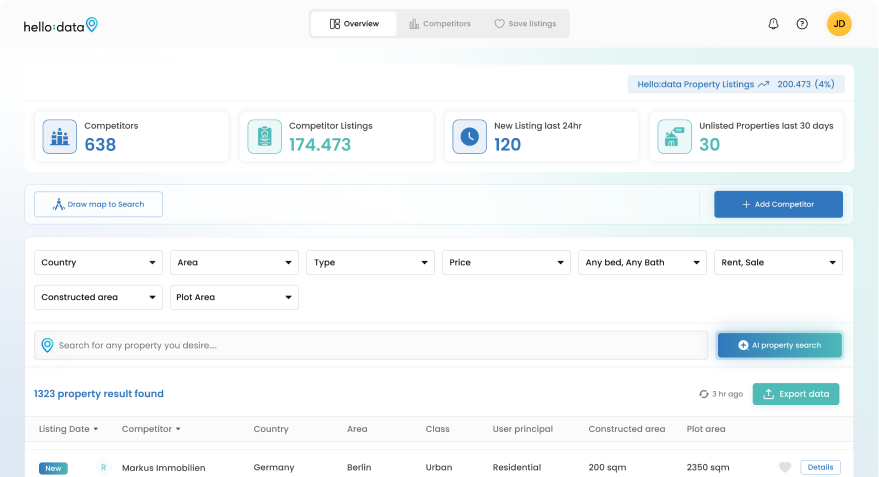What is a Distressed Property? Understanding the Basics
A distressed property refers to a real estate asset that is in poor condition or facing financial challenges. These properties may include:
- Foreclosures: Homes that have gone through the foreclosure process due to unpaid mortgages.
- REO Properties: Real Estate Owned properties acquired by lenders after foreclosure.
- Short Sales: Properties where the seller owes more than the home’s market value and seeks lender approval for a sale at a loss.
Distressed properties hold significant importance in the real estate market for several reasons:
- Investment Opportunities: They often come at reduced prices, providing potential for substantial returns on investment.
- Market Dynamics: Understanding distressed properties can aid in navigating market fluctuations and seizing timely opportunities.
Key takeaway: Grasping the concept of distressed properties opens doors to lucrative investments. However, it is vital to carefully assess associated risks such as repair costs, legal issues, and lengthy closing processes.
To mitigate these risks, tools like Artificial Intelligence and Proptech can streamline the search and evaluation process. These advancements not only maximize chances of success but also make it easier to navigate complexities such as understanding concepts like DSCR in real estate or exploring strategies like rental arbitrage.
Moreover, it’s essential to be aware of unique property scenarios such as land-locked properties, which can present additional challenges in real estate transactions.
Types of Distressed Properties You Should Know
Understanding the various types of distressed properties is crucial for any investor looking to capitalize on this niche market. Each type carries its own characteristics and implications for buyers. Here’s an overview of the most common types of distressed properties:
1. Foreclosures
A foreclosure occurs when a homeowner fails to make mortgage payments, leading the lender to take possession of the property. The process generally unfolds as follows:
- Notice of Default: The lender issues a notice indicating that the homeowner is behind on payments.
- Auction: The property is put up for public auction. If it does not sell, it becomes an REO property.
Buyers can acquire foreclosures at potentially lower prices, but they often require significant repairs and adjustments. It’s essential to conduct thorough research on the property’s condition and any outstanding liens.
2. REO Properties
Real Estate Owned (REO) properties are those that have gone through the foreclosure process and remain unsold after the auction. They are now owned by the bank or financial institution.
Characteristics include:
- Typically sold “as-is”, meaning buyers might face additional costs for repairs.
- Banks may be more motivated to sell quickly, leading to opportunities for negotiation on price.
Understanding how to navigate bank-owned sales can lead to advantageous deals, but be prepared for potential complications in financing or title clearance.
3. Short Sales
A short sale occurs when a homeowner sells their property for less than the total amount owed on their mortgage, with lender approval required.
The process involves several key steps:
- Listing the Property: The homeowner lists their house at a price that reflects its market value, which is typically lower than what they owe.
- Submitting Documentation: The seller provides financial documentation to demonstrate their inability to continue making payments.
- Lender Approval: The lender reviews and approves the sale, considering it as a way to minimize losses.
Short sales can provide excellent investment opportunities due to lower purchase prices, but they often involve lengthy negotiations and waiting periods before finalizing.
Recognizing these types of distressed properties equips you with valuable insights into your investment options. Each category presents unique challenges and benefits that can lead to rewarding outcomes when approached thoughtfully and strategically.
Moreover, understanding concepts like external obsolescence in real estate, which refers to a loss of value due to external factors, can further enhance your decision-making process in this sector.
Additionally, strategies such as seller carry-back can provide more flexible financing options during your property acquisition process.
In terms of maximizing your investment potential, conducting a multifamily rent survey could yield beneficial insights into rental income trends in specific areas.
Furthermore, having a solid grasp of the income approach in real estate appraisal will allow
The Pros and Cons of Investing in Distressed Properties
Investing in distressed properties can be a double-edged sword. Understanding the pros and cons of buying distressed properties is crucial for making informed decisions.
Advantages
- Potential for Significant Savings: Distressed properties often sell below market value. This provides a unique opportunity to acquire real estate at a lower cost, which can lead to substantial financial gains upon resale.
- Opportunities for Renovation Profits: Buyers can increase the property’s value through renovations or repairs. This potential for appreciation makes distressed properties appealing to savvy investors looking to enhance their investment portfolio.
- Expanding Investment Portfolios: Incorporating distressed properties into your real estate strategy diversifies your investments. This approach not only mitigates risk but also opens doors to different market segments.
Disadvantages
- Risks Associated with Repairs: Distressed properties frequently require extensive repairs. Unexpected costs may arise during renovations, potentially eating into profits if not properly budgeted.
- Potential Title Issues: Properties that are distressed may come with complicated title histories. Buyers should be prepared for possible liens or unresolved legal matters that can complicate ownership.
- Lengthy Closing Processes: The purchase process can be drawn out due to negotiations, repairs, and inspections. Investors must be patient and prepared for potential delays that can affect cash flow and project timelines.
Understanding these key points enables you to weigh the benefits against the risks effectively. With careful planning and consideration, investing in distressed properties can indeed transform your investment portfolio while navigating the complexities involved.
However, it’s essential to be aware of certain factors such as loss-to-lease that could impact your investment returns. Additionally, knowing the cheapest ways to sell a house could prove beneficial when it’s time to liquidate your asset.
How to Find Distressed Properties for Sale
Finding distressed properties for sale is essential for making smart investment decisions. Several practical strategies can help you uncover these hidden gems in the market.
1. Utilizing Technology and Platforms
Advanced technologies play a significant role in identifying distressed properties. Platforms like Hello Here revolutionize the way we search for real estate opportunities. With AI-driven data aggregation, Hello Here provides access to an extensive database of listings—far surpassing traditional platforms. You can quickly filter through properties based on your criteria, allowing you to find distressed properties that may not be listed elsewhere.
- The app simplifies property matching, making it as intuitive as a dating app.
- Gain insights into property history, neighborhood trends, and pricing dynamics with tools powered by Support Vector Machines.
2. Networking with Real Estate Agents
Establishing connections with real estate agents who specialize in distressed sales can open up new avenues. These professionals possess valuable insights and access to off-market listings that may not be widely advertised.
- Look for agents with experience in handling foreclosures, short sales, and REO properties.
- Attend local real estate meetups or seminars to build relationships within the industry.
By leveraging technology such as the innovative features offered by Hello Here and networking effectively, you position yourself to discover lucrative investment opportunities in distressed properties. Each method offers unique advantages that can enhance your search process and expand your portfolio significantly. Embrace these strategies to gain a competitive edge in the real estate market, including exploring ways to diversify and conquer your real estate portfolio.
Navigating the Auction Process for Distressed Homes
Participating in the auction process for distressed homes can be exhilarating and intimidating. Understanding the steps involved is crucial to making informed decisions and avoiding common pitfalls. Here’s a step-by-step guide to navigate this process effectively:
1. Research the Auction
- Identify upcoming auctions in your area through local listings or online platforms.
- Familiarize yourself with the specific auction rules and procedures, which can vary by location.
2. Inspect the Property
- Whenever possible, inspect the property before the auction date.
- Look for any signs of damage or needed repairs to assess potential costs. You may want to understand what constitutes a warm shell condition as it could impact your renovation budget.
3. Set a Budget
- Determine your maximum bid amount to avoid getting outbid at auction without a plan.
- Factor in additional costs such as renovation expenses, taxes, and fees associated with the auction.
4. Explore Financing Options
- If you need financial assistance, consider options like a HUD 221(d)(4) loan, which can help cover costs related to property repairs or renovations.
- Alternatively, a HELOC might be suitable if you have equity in another property.
5. Register for the Auction
- Complete any required registration before participating in the auction.
- Bring necessary documentation, including proof of funds if required.
6. Understand Bidding Strategies
- Start with a conservative bid to gauge interest from other buyers.
- Stay calm during bidding; emotional decisions can lead to overspending.
7. Be Prepared for Competition
- Expect competition from other investors and homebuyers eager to snag distressed properties at a bargain price.
- A well-prepared strategy will help you stay focused on your budget.
8. Know When to Walk Away
- If bidding exceeds your budget or if property conditions are worse than anticipated, don’t hesitate to withdraw from bidding.
- There will always be more opportunities down the line.
9. Post-Auction Procedures
- If successful, complete any necessary paperwork promptly and prepare for closing processes, which can sometimes be lengthy.
- Be aware of any specific requirements such as obtaining a BSPRA credit if applicable.
By following these steps, you’ll enhance your chances of successfully navigating the auction process for distressed homes while minimizing potential risks associated with impulsive decisions.
Evaluating Risks When Purchasing Distressed Properties
Investing in distressed properties can be rewarding, but it comes with significant risks. Understanding these risks is crucial to making informed decisions. One of the most important steps in this process is conducting thorough inspections.
The Importance of Property Inspection
A comprehensive property inspection helps uncover potential hidden costs or issues that could arise after purchase. Here are key areas to focus on during the inspection:
- Structural Integrity: Check for signs of foundational issues, such as cracks in walls or uneven floors. Structural problems can lead to costly repairs.
- Roof Condition: Inspect the roof for missing shingles or leaks. Roof repairs can be expensive and time-consuming.
- Electrical and Plumbing Systems: Verify that these systems are functioning correctly. Faulty wiring or plumbing leaks can pose safety hazards and require significant investment to fix.
- Pest Infestations: Look for evidence of pests, such as termites or rodents. Pest control can add unexpected expenses.
Hidden Costs to Consider
In addition to the visible issues uncovered during an inspection, consider these potential hidden costs:
- Renovation Expenses: Budget for renovations that may be necessary to bring the property up to code or enhance its value.
- Title Issues: Research any outstanding liens or claims against the property that could complicate ownership.
Thorough evaluations empower you with knowledge, allowing for smarter financial choices. Taking these concerns seriously can make a significant difference in your investment success.
Understanding Financing Options Available for Distressed Properties
Purchasing a distressed property often requires navigating unique financing options tailored to the specific challenges these homes present. Here are key avenues buyers can explore:
1. Conventional Loans
Traditional lenders may offer financing, but they often hesitate when it comes to properties sold “as is.” A thorough inspection is essential to understand potential risks.
2. FHA 203(k) Loans
The Federal Housing Administration (FHA) provides loans that allow buyers to finance both the purchase and renovation costs in one mortgage. This is particularly beneficial for properties needing significant repairs.
3. Hard Money Loans
These are short-term, high-interest loans from private lenders, suitable for investors who plan to flip a property quickly. They typically require less documentation but come with higher risks.
4. Cash Offers
Many distressed properties attract cash buyers due to the speed of transactions. If you’re financially prepared, making a cash offer can give you a competitive edge in negotiations.
Challenges arise with financing distressed properties, such as stricter appraisal requirements and potential title issues. Buyers must be proactive in understanding their lender’s policies and preparing for additional costs associated with repairs or renovations.
Researching various financing options is crucial for successful investments in distressed properties. Each choice has its advantages and disadvantages, and aligning them with your investment strategy will pave the way for informed decision-making in this lucrative market.
The Role of Local Laws in Distressed Property Transactions
Understanding the legal landscape is crucial when dealing with distressed properties. Each state has its own regulations that can significantly impact your buying experience. Here are key considerations:
1. State-Specific Laws
Different states have unique laws governing distressed property transactions. For example, Washington State law on distressed property law RCW provides specific guidelines regarding foreclosure processes and buyer protections.
2. Legal Protections
Some states offer additional protections for buyers, ensuring transparency during the purchase process. Familiarizing yourself with these laws can safeguard against potential pitfalls.
3. Consult Legal Professionals
Engaging a real estate attorney or legal expert who understands local regulations is vital. They can provide insights into any obligations you may have as a buyer and help navigate complex legal requirements.
4. Impact on Transactions
Local laws can affect everything from bid processes at auctions to the timeline of closing deals. Ignoring these regulations can lead to costly mistakes.
Understanding these aspects not only enhances your purchasing strategy but also ensures you’re making informed decisions in the distressed property market.
How Hello Here Can Help You Navigate Distressed Property Investments
Investing in distressed properties can be a game-changer. With the right tools, you can streamline your search and make informed decisions. Enter Hello Here, an innovative AI-driven real estate app tailored for investors seeking distressed properties.
Key Features of Hello Here:
1. Advanced Property Matching
The app employs cutting-edge AI technology to match you with properties that fit your specific criteria. This means less time sifting through listings and more time identifying lucrative opportunities. This AI property search is revolutionizing the way we find real estate.
2. Comprehensive Data Access
Hello Here aggregates real estate data, providing access to 4x more listings than major platforms like Idealista. You’ll find an extensive range of options that other platforms may overlook. Our real estate data scraping capabilities make this possible.
3. Insightful Market Analysis
Stay ahead with real-time market insights that help you evaluate potential investments effectively. Understanding the nuances of each property is crucial, especially when dealing with repairs or renovations. For instance, knowing how to maximize your investment by understanding the cap rate vs interest rate can significantly impact your decision-making process.
4. User-Friendly Interface
Designed like a dating app, the interface simplifies property searches, making navigation intuitive and enjoyable.
With Hello Here, you’re not just finding distressed properties; you’re equipped to make strategic decisions backed by data. Whether it’s evaluating property repairs or comparing investment potential, this app empowers you to take control of your real estate journey.
Harness the power of AI and unlock new avenues in distressed property investment today with Hello Here. Remember, understanding concepts like as-stabilized value in real estate investments can further enhance your investment strategy. Also, it’s essential to know the difference between black box and explainable AI, as it can provide valuable insights into how our AI operates.









